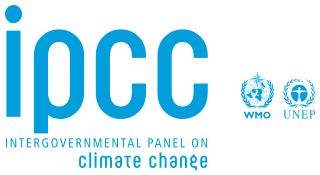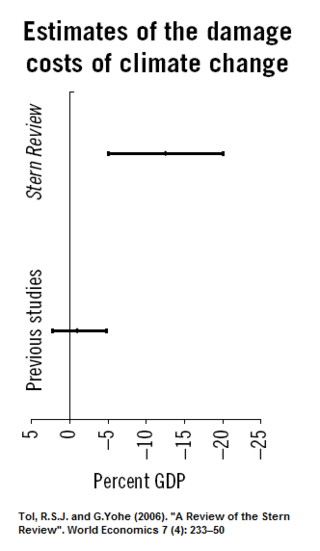Related Research Articles

The Intergovernmental Panel on Climate Change (IPCC) is an intergovernmental body of the United Nations. Its job is to advance scientific knowledge about climate change caused by human activities. The World Meteorological Organization (WMO) and the United Nations Environment Programme (UNEP) established the IPCC in 1988. The United Nations endorsed the creation of the IPCC later that year. It has a secretariat in Geneva, Switzerland, hosted by the WMO. It has 195 member states who govern the IPCC. The member states elect a bureau of scientists to serve through an assessment cycle. A cycle is usually six to seven years. The bureau selects experts to prepare IPCC reports. It draws the experts from nominations by governments and observer organizations. The IPCC has three working groups and a task force, which carry out its scientific work.

Bert Rickard Johannes Bolin was a Swedish meteorologist who served as the first chairman of the Intergovernmental Panel on Climate Change (IPCC), from 1988 to 1997. He was professor of meteorology at Stockholm University from 1961 until his retirement in 1990.

The IPCC Third Assessment Report (TAR), Climate Change 2001, is an assessment of available scientific and socio-economic information on climate change by the IPCC. Statements of the IPCC or information from the TAR were often used as a reference showing a scientific consensus on the subject of global warming. The Third Assessment Report (TAR) was completed in 2001 and consists of four reports, three of them from its Working Groups: Working Group I: The Scientific Basis; Working Group II: Impacts, Adaptation and Vulnerability; Working Group III: Mitigation; Synthesis Report. A number of the TAR's conclusions are given quantitative estimates of how probable it is that they are correct, e.g., greater than 66% probability of being correct. These are "Bayesian" probabilities, which are based on an expert assessment of all the available evidence.

The Special Report on Emissions Scenarios (SRES) is a report by the Intergovernmental Panel on Climate Change (IPCC) that was published in 2000. The greenhouse gas emissions scenarios described in the Report have been used to make projections of possible future climate change. The SRES scenarios, as they are often called, were used in the IPCC Third Assessment Report (TAR), published in 2001, and in the IPCC Fourth Assessment Report (AR4), published in 2007. The SRES scenarios were designed to improve upon some aspects of the IS92 scenarios, which had been used in the earlier IPCC Second Assessment Report of 1995. The SRES scenarios are "baseline" scenarios, which means that they do not take into account any current or future measures to limit greenhouse gas (GHG) emissions.

The economic analysis of climate change explains how economic thinking, tools and techniques are applied to calculate the magnitude and distribution of damage caused by climate change. It also informs the policies and approaches for mitigation and adaptation to climate change from global to household scales. This topic is also inclusive of alternative economic approaches, including ecological economics and degrowth. In a cost–benefit analysis, the trade offs between climate change impacts, adaptation, and mitigation are made explicit. Cost–benefit analyses of climate change are produced using integrated assessment models (IAMs), which incorporate aspects of the natural, social, and economic sciences. The total economic impacts from climate change are difficult to estimate, but increase for higher temperature changes.
Climate Change 2007, the Fourth Assessment Report (AR4) of the United Nations Intergovernmental Panel on Climate Change (IPCC), was published in 2007 and is the fourth in a series of reports intended to assess scientific, technical and socio-economic information concerning climate change, its potential effects, and options for adaptation and mitigation. The report is the largest and most detailed summary of the climate change situation ever undertaken, produced by thousands of authors, editors, and reviewers from dozens of countries, citing over 6,000 peer-reviewed scientific studies. People from over 130 countries contributed to the IPCC Fourth Assessment Report, which took six years to produce. Contributors to AR4 included more than 2,500 scientific expert reviewers, more than 800 contributing authors, and more than 450 lead authors.
The planetary phase of civilization is a term created by the Global Scenario Group (GSG) to describe the contemporary era in which increasing global interdependence and risks are binding the world into a unitary socio-ecological system. Characteristics of this phase include economic globalization, biospheric destabilization, mass migration, new global institutions, the Internet, new forms of transboundary conflict, and shifts in culture and consciousness.

The Tellus Institute is an American non-profit organization established in 1976 with the aim of bringing scientific rigor and systemic vision to critical environmental and social issues. Tellus has conducted thousands of projects throughout the world, and now focuses on the global future and how to shape it.

Paul Raskin is the founding president of the Tellus Institute, which has conducted over 3,500 research and policy projects throughout the world on environmental issues, resource planning, scenario analysis, and sustainable development. His research and writing has centered on propagating the Great Transition. Raskin has served as a lead author on a number of high-profile international reports, including the U.S. National Academy of Science's Board on Sustainability, the Millennium Ecosystem Assessment, the United Nations Environment Programme's Global Environment Outlook, the Earth Charter, and the Intergovernmental Panel on Climate Change (IPCC) Third Assessment Report.
The International Institute for Environment and Development (IIED) is an independent policy research institute whose stated mission is to "build a fairer, more sustainable world, using evidence, action and influence in partnership with others." Its director is Dr Tom Mitchell.
Great Transition is used by the Great Transition Initiative and its predecessor, the Global Scenario Group (GSG), to describe a vision of a just and sustainable global future. The term was originally coined by Kenneth E. Boulding in The Meaning of the 20th Century – The Great Transition (1964) and describes the shift from pre-modern to post-modern culture, and the four possible courses of action that these organizations believe will allow humanity to successfully manage the Great Transition.

The Fifth Assessment Report (AR5) of the United Nations Intergovernmental Panel on Climate Change (IPCC) is the fifth in a series of such reports and was completed in 2014. As had been the case in the past, the outline of the AR5 was developed through a scoping process which involved climate change experts from all relevant disciplines and users of IPCC reports, in particular representatives from governments. Governments and organizations involved in the Fourth Report were asked to submit comments and observations in writing with the submissions analysed by the panel. Projections in AR5 are based on "Representative Concentration Pathways" (RCPs). The RCPs are consistent with a wide range of possible changes in future anthropogenic greenhouse gas emissions. Projected changes in global mean surface temperature and sea level are given in the main RCP article.

The economics of climate change mitigation is a contentious part of climate change mitigation – action aimed to limit the dangerous socio-economic and environmental consequences of climate change.

Climate change scenarios or socioeconomic scenarios are projections of future greenhouse gas (GHG) emissions used by analysts to assess future vulnerability to climate change. Scenarios and pathways are created by scientists to survey any long term routes and explore the effectiveness of mitigation and helps us understand what the future may hold. This will allow us to envision the future of human environment system. Producing scenarios requires estimates of future population levels, economic activity, the structure of governance, social values, and patterns of technological change. Economic and energy modelling can be used to analyze and quantify the effects of such drivers.
Transition scenarios are descriptions of future states which combine a future image with an account of the changes that would need to occur to reach that future. These two elements are often created in a two-step process where the future image is created first (envisioning) followed by an exploration of the alternative pathways available to reach the future goal (backcasting). Both these processes can use participatory techniques where participants of varying backgrounds and interests are provided with an open and supportive group environment to discuss different contributing elements and actions.
The global citizens movement is a constellation of organized and overlapping citizens' groups seeking to foster global solidarity in policy and consciousness. The term is often used synonymously with the anti-globalization movement or the global justice movement.

Fatima Denton is a British-Gambian climatologist. She is the director at the Ghanaian branch of the United Nations University, at the UNU Institute for Natural Resources in Africa (UNU-INRA) in Accra. She focuses on innovation, science, technology and natural resource management. She partners with countries such as Benin and Liberia to develop and implement country needs assessment missions.

Tariq Javed Banuri is a Pakistani academic, development economist, environmentalist, climate scientist, educationalist, human rights advocate, and author who holds a PhD in economics from Harvard University and who is the fourth and current Chairperson of the Higher Education Commission (HEC), a statutorily established regulatory agency whose mandate is to improve and promote higher education and research & development (R&D) within Pakistan. Tariq Banuri has broad experience on the interface between policy, research, and practical actions on the realization of the goal of sustainable development. He has worked in government, academia, civil society, and the international system, specializing in economic development.
Joeri Rogelj is a Belgian climate scientist working on solutions to climate change. He explores how societies can transform towards sustainable futures. He is a Professor in Climate Science and Policy at the Centre for Environmental Policy (CEP) and Director of Research at the Grantham Institute – Climate Change and Environment, both at Imperial College London. He is also affiliated with the International Institute for Applied Systems Analysis. He is an author of several climate reports by the Intergovernmental Panel on Climate Change (IPCC) and the United Nations Environment Programme (UNEP), and a member of the European Scientific Advisory Board for Climate Change.
References
- ↑ "World Water Council - Vision Report Chapter 3".
- ↑ "Highlights of the OECD Environmental Outlook" (PDF). p. 7. Retrieved 20 May 2013.
- ↑ "IPCC Third Assessment Report - Climate Change 2001 - Working Group III: Mitigation".
- ↑ Global Environment Outlook Scenario Framework: Background Paper for UNEP's Third Global Environment Outlook Report. UNEP. Division of early warning and assessment. 2004. ISBN 978-92-807-2461-5.
- ↑ "Ecosystems and Human Well-Being: A Framework for Assessment - Chapter 7" (PDF). p. 168.
- ↑ Global Scenario Group. "About the GSG." Accessed January 9, 2024. https://gsg.org/about-the-gsg.html.
- ↑ "Contribution of Working Group III to the Fourth Assessment Report of the Intergovernmental Panel on Climate Change, 2007". Archived from the original on 2014-10-12. Retrieved 2013-05-20.
- ↑ Paul Raskin, Tariq Banuri, Gilberto Gallopín, Pablo Gutman, Al Hammond, Robert Kates, and Rob Swart, Great Transition: The Promise and Lure of the Times Ahead (Boston: Stockholm Environment Institute, 2002), http://www.greattransition.org/gt-essay. See also its sequel: Paul Raskin, Journey to Earthland: The Great Transition to Planetary Civilization. Boston: Tellus Institute, 2016, http://www.greattransition.org/publication/journey-to-earthland.